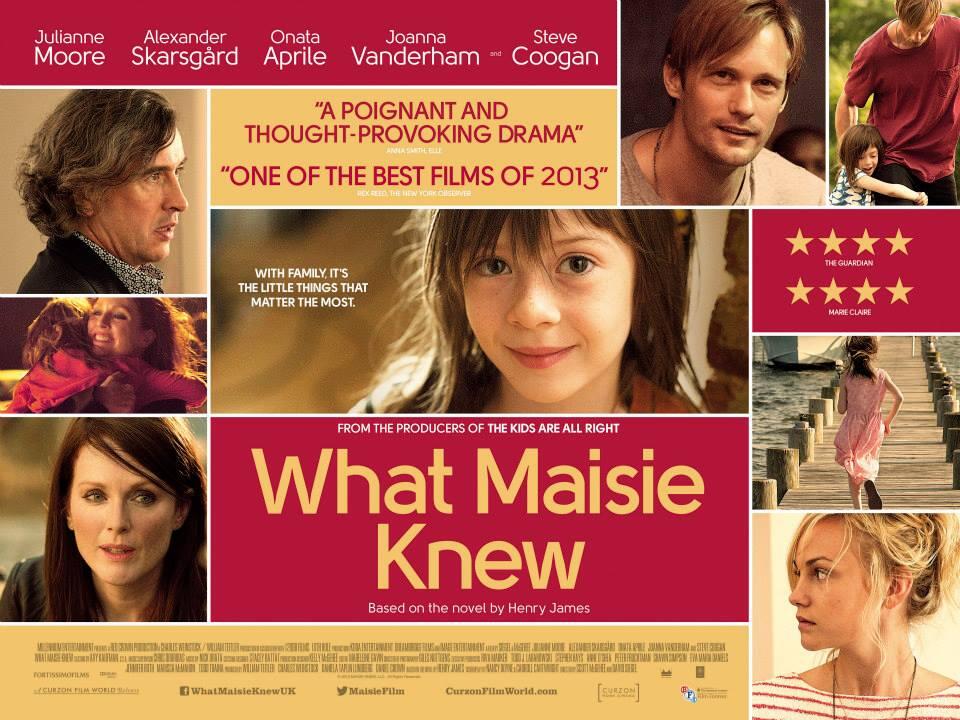 “I don’t wanna ruin it,” says Maisie (Onata Aprile) midway through What Maisie Knew, in reference to her mother Susanna’s (Julianne Moore) new relationship with Lincoln (Alexander Skarsgård). A happy family life is an illusion, a fragile reality for young Maisie, given that she grew up with argumentative, aggressive parents Susanna, a rock’n’roll icon, and Beale (Steve Coogan), a self-absorbed art dealer. What Maisie Knew is set up to play the slightest variations on a single note, but, after Henry James’ sentient 1897 novel, it does so with a delicate observational skill, poignantly but not sentimentally. The central cast of five – the last being Margo (Joanna Vanderham), Maisie’s caring and naïve nanny-come-stepmother – are expert in their negotiation of a story of people’s most inherent weaknesses.
“I don’t wanna ruin it,” says Maisie (Onata Aprile) midway through What Maisie Knew, in reference to her mother Susanna’s (Julianne Moore) new relationship with Lincoln (Alexander Skarsgård). A happy family life is an illusion, a fragile reality for young Maisie, given that she grew up with argumentative, aggressive parents Susanna, a rock’n’roll icon, and Beale (Steve Coogan), a self-absorbed art dealer. What Maisie Knew is set up to play the slightest variations on a single note, but, after Henry James’ sentient 1897 novel, it does so with a delicate observational skill, poignantly but not sentimentally. The central cast of five – the last being Margo (Joanna Vanderham), Maisie’s caring and naïve nanny-come-stepmother – are expert in their negotiation of a story of people’s most inherent weaknesses.
Susanna and Beale, it’s clear, simply can’t be parents – the fibres of who they are pull away from the position, one that, as Margo clearly recognises, is a lifelong commitment. Susanna’s fierce temper translates into ardent passion for her daughter, but it’s a selfish love – when she has the time and presence for her child, she’s hers and hers alone, and even her new husband’s cautious attentions to his new stepdaughter are met with a jealous glare across the room. Moore is completely unsentimental in how she approaches Susanna – she’s a wild, maddening woman who’s completely swallowed her own lifestyle, blind to the fact that late-night jam sessions are totally unsuitable for her daughter’s sleepover friend. With the film quietly positioned from Maisie’s perspective, directors Scott McGehee and David Siegel aren’t below giving Susanna a slightly macabre edge – her laugh echoes, eerily, as she goes off-screen one evening, leaving little Maisie alone in the darkness of her apartment.
 That’s what excuses, and in many ways validates the rather plain shading of nice and nasty here; Maisie’s innocent instincts favour the tender affection of Margo over the fleeting attentions of her parents, and her amorous attachment to the handsome Lincoln isn’t exactly hard to understand. It’s as difficult to play nice as it is to play nasty, but both Skarsgård and Vanderham (a keenly appealing find) anchor their characters in a sorrowful disconnection from the partners they stumble onto. Coogan, his British aloofness a handy shortcut for the disinterested father routine, probably gets short shrift here in sympathy terms, quickly becoming the more absent of the absent parents.
That’s what excuses, and in many ways validates the rather plain shading of nice and nasty here; Maisie’s innocent instincts favour the tender affection of Margo over the fleeting attentions of her parents, and her amorous attachment to the handsome Lincoln isn’t exactly hard to understand. It’s as difficult to play nice as it is to play nasty, but both Skarsgård and Vanderham (a keenly appealing find) anchor their characters in a sorrowful disconnection from the partners they stumble onto. Coogan, his British aloofness a handy shortcut for the disinterested father routine, probably gets short shrift here in sympathy terms, quickly becoming the more absent of the absent parents.
It’s Aprile’s film, though, and she’s a hugely sympathetic presence, irresistible from her first bubble of laughter. She often works more as a figure within space – shots of her sitting in the vastness of a blank apartment lobby are enough to make the heart bleed – than an active character, but she’s a precociously astute performer, attuned to Maisie’s fickle childish feelings as they cohese into realisations of her difficult situation. One of the film’s major boons is her chemistry with the ever-generous Moore: there’s a genuine warmth to their reunions, and thus a genuine harshness to Maisie’s muted distress at her mother’s often brusque attitude.
 Mostly a performance piece, McGehee and Siegel retain their soft observational style from Bee Season, using a crisp photography style that captures New York in its angular insularity, and only intruding with the lightest of montages to give image to Maisie’s youthful moods. Precise use of the sound design aligns us with Maisie, as she and we hear flashes of conversations, whether through movement or simple disinterest. That simultaneously makes What Maisie Knew a portrait of both a child affected by divorce and simply childhood itself – Maisie finds her happiness where she can, and while her own parents’ acrimony shows the dark side of a family unit, there’s also the hint of happiness outside such traditional boundaries.
Mostly a performance piece, McGehee and Siegel retain their soft observational style from Bee Season, using a crisp photography style that captures New York in its angular insularity, and only intruding with the lightest of montages to give image to Maisie’s youthful moods. Precise use of the sound design aligns us with Maisie, as she and we hear flashes of conversations, whether through movement or simple disinterest. That simultaneously makes What Maisie Knew a portrait of both a child affected by divorce and simply childhood itself – Maisie finds her happiness where she can, and while her own parents’ acrimony shows the dark side of a family unit, there’s also the hint of happiness outside such traditional boundaries.




